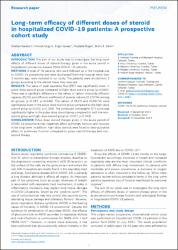Long-term efficacy of different doses of steroid in hospitalized COVID-19 patients: A prospective cohort study
Citation
Karakurt, G., Ucgun, H., Aynaci, E., DÜGER, M., & Demir, S. E., (2023). Long-term efficacy of different doses of steroid in hospitalized COVID-19 patients: A prospective cohort study. Pneumon , vol.36, no.4.Abstract
INTRODUCTION The aim of our study was to investigate the long-term effects of different doses of steroid therapy given in the acute period in hospitalized coronavirus disease 2019 (COVID-19) patients. METHODS A total of 78 patients who were followed up in the hospital due to COVID-19 pneumonia and were discharged from the hospital more than 3 months ago, were included in our study. The patients were divided into 3 groups according to the steroid doses they received. RESULTS The value of peak expiratory flow (PEF) was significantly lower in pulse-dose steroid group compared to high-dose steroid group (p=0.040). There was a significant difference in the values of carbon monoxide diffusion capacity (DLCO) and diffusion coefficient of alveolar volume (DLCO/VA) among all groups (p=0.027, p=0.048). The values of DLCO and DLCO/VA were significantly lower in the pulse-dose steroid group compared to the high-dose steroid group (p=0.022, p=0.049). The computed tomography (CT) score was significantly higher in the pulse-dose steroid group compared to both the nonsteroid group and high-dose steroid group (p=0.027, p=0.043). CONCLUSIONS Pulse-dose steroid therapy given in the acute period of COVID-19 pneumonia may negatively affect pulmonary function and recovery in the long-term. In addition, high-dose steroids were found to have a positive effect on pulmonary function compared to pulse-steroid therapy and nonsteroid therapy.

















